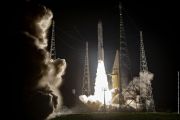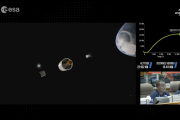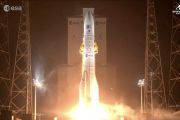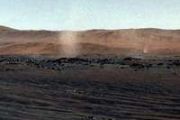
Copernical Team
We're heading for Venus: ESA approves EnVision
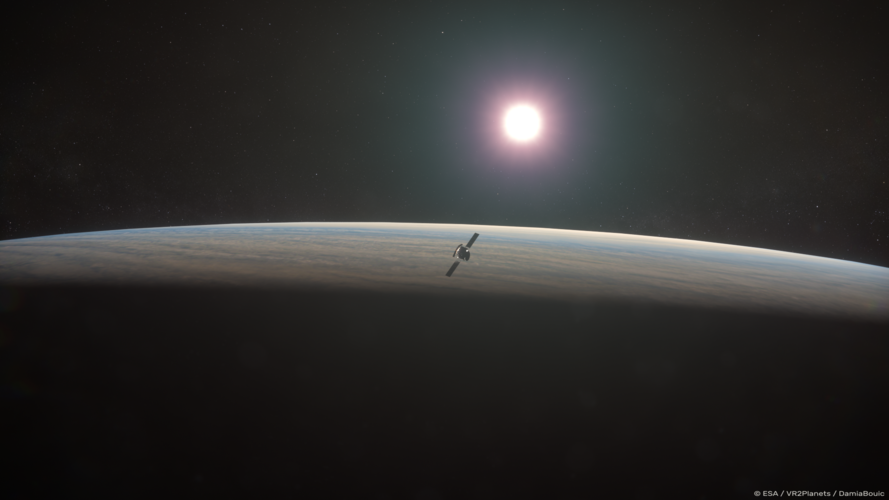
ESA’s next mission to Venus was officially ‘adopted’ today by the Agency’s Science Programme Committee. EnVision will study Venus from its inner core to its outer atmosphere, giving important new insight into the planet's history, geological activity and climate.
Capturing the ripples of spacetime: LISA gets go-ahead

Today, ESA’s Science Programme Committee approved the Laser Interferometer Space Antenna (LISA) mission, the first scientific endeavour to detect and study gravitational waves from space.
World’s largest iceberg drifts beyond Antarctic waters
 Video:
00:00:20
Video:
00:00:20
In November 2023, the A23a mega iceberg set sail after being grounded on the ocean floor for well over 40 years. Now, driven by winds and currents, A23a is heading away from Antarctic waters as seen in this new animation.
The iceberg calved from West Antarctica in 1986 but quickly grounded itself in the Weddell Sea where it remained for over four decades. At around 4000 sq km in area, more than four times the size of New York City, and just over 280 m thick, the berg currently holds the title for world’s largest iceberg.
The animation uses
Hubble finds water vapour in small exoplanet’s atmosphere

Astronomers using the NASA/ESA Hubble Space Telescope observed the smallest exoplanet where water vapour has been detected in its atmosphere. At only approximately twice Earth’s diameter, the planet GJ 9827d could be an example of potential planets with water-rich atmospheres elsewhere in our galaxy.
Sols 4076-4077: Driving Into Springtime
 Earth planning date: Monday, January 22, 2024: Here in Toronto (along with much of Canada and the United States), we've spent the last few weeks bathed in an icy blast of arctic air, which has been quite a dramatic contrast with the very mild winter that we've had up until now. However, it is starting to warm back up, not just here but on Mars as well. We're just past the halfway point of the cu
Earth planning date: Monday, January 22, 2024: Here in Toronto (along with much of Canada and the United States), we've spent the last few weeks bathed in an icy blast of arctic air, which has been quite a dramatic contrast with the very mild winter that we've had up until now. However, it is starting to warm back up, not just here but on Mars as well. We're just past the halfway point of the cu Study reveals non-isotropic nature of tropospheric delays in GNSS
 Researchers from Shandong University of Science and Technology have published a study that sheds new light on the intricate nature of tropospheric delays impacting Global Navigation Satellite Systems (GNSS). This study, featured in the journal Satellite Navigation, goes beyond the traditional isotropic and anisotropic assumptions in tropospheric modeling, introducing a novel perspective on the n
Researchers from Shandong University of Science and Technology have published a study that sheds new light on the intricate nature of tropospheric delays impacting Global Navigation Satellite Systems (GNSS). This study, featured in the journal Satellite Navigation, goes beyond the traditional isotropic and anisotropic assumptions in tropospheric modeling, introducing a novel perspective on the n UK Space Agency Boosts Agri-tech Start-Up at Space Park Leicester
 In a notable advancement for the agri-tech sector, the UK Space Agency has recently endorsed Messium, an agri-tech start-up, by accepting it onto its exclusive Geo Accelerator program. This move highlights the UK's commitment to fostering innovation in agricultural technology, particularly in the realm of reducing global agricultural waste.
Messium, established in May of the previous year,
In a notable advancement for the agri-tech sector, the UK Space Agency has recently endorsed Messium, an agri-tech start-up, by accepting it onto its exclusive Geo Accelerator program. This move highlights the UK's commitment to fostering innovation in agricultural technology, particularly in the realm of reducing global agricultural waste.
Messium, established in May of the previous year, Redwire joins forces with Blue Origin on Blue Ring Space Mobility Platform
 Redwire Corporation (NYSE: RDW) has reports the company has been awarded a contract to develop and provide four Roll-Out Solar Array (ROSA) wings, along with multiple Argus cameras and Low Voltage Distribution Units (LVDUs) for Blue Origin's pioneering space mobility platform, Blue Ring.
Mike Gold, Redwire's Chief Growth Officer, expressed pride in the company's role as a "key mission enab
Redwire Corporation (NYSE: RDW) has reports the company has been awarded a contract to develop and provide four Roll-Out Solar Array (ROSA) wings, along with multiple Argus cameras and Low Voltage Distribution Units (LVDUs) for Blue Origin's pioneering space mobility platform, Blue Ring.
Mike Gold, Redwire's Chief Growth Officer, expressed pride in the company's role as a "key mission enab Renesas Electronics plays role in Japan's lunar landing mission
 Renesas Electronics Corporation (TSE:6723), a leader in advanced semiconductor solutions, reports that the company's radiation-hardened (rad-hard) integrated circuits (ICs) were integral to the Smart Lander for Investigating Moon (SLIM) spacecraft, which completed a lunar landing on January 20.
Operated by the Japan Aerospace Exploration Agency (JAXA), SLIM embarked on its journey to the M
Renesas Electronics Corporation (TSE:6723), a leader in advanced semiconductor solutions, reports that the company's radiation-hardened (rad-hard) integrated circuits (ICs) were integral to the Smart Lander for Investigating Moon (SLIM) spacecraft, which completed a lunar landing on January 20.
Operated by the Japan Aerospace Exploration Agency (JAXA), SLIM embarked on its journey to the M 
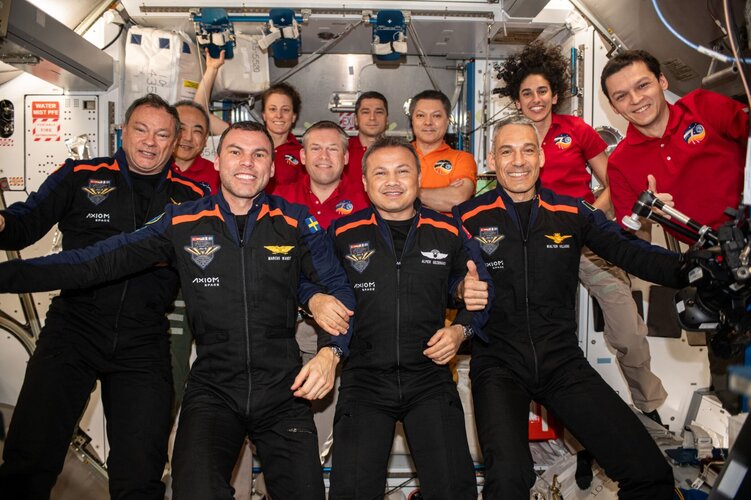 Image:
Full house
Image:
Full house 